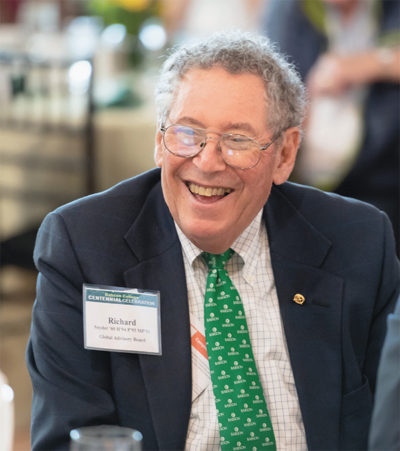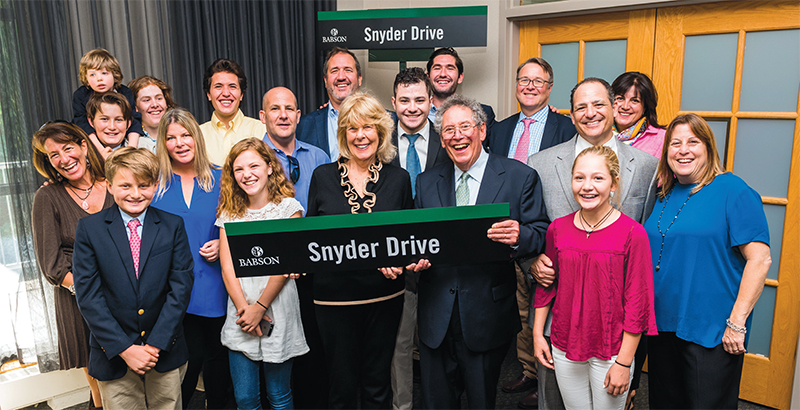Richard J. Snyder ’60, H’94, P’93 ’01, trustee emeritus, Global Advisory Board
Richard Snyder graduated from Babson in 1960 and then went on to law school. He served as a White House summer intern and was a trial lawyer with the Department of Justice before entering private practice in 1966. Snyder continues to serve as legal counsel and advisor to business entities of all sizes, including for-profit and not-for-profit institutions and domestic and foreign corporations. He is a former chair of the Board of Trustees at Babson College and currently serves on the Global Advisory Board.

Richard J. Snyder ’60, H’94, P’93 ’01, trustee emeritus, Global Advisory Board
Photo: Justin Knight
What is your favorite memory of being a student at Babson?
Where the Globe is now used to be faculty housing, resulting in ’round-the-clock access to faculty. One could hang around and have access to them much of the time, just sit on the porch and talk about stuff. We solved problems and learned together.
Was there a Babson professor who really changed your life or made you look at life differently?
Walter Carpenter, who taught labor relations and later became dean of faculty—really a wonderful guy. He drove home the idea that if you want to have a successful business, management has a responsibility to have a supportive relationship with employees and treat them with respect. This changed my perspective.
Do you have any funny memories from a specific class or professor?
I majored in accounting because it was the only thing my dad would pay for. He believed that accounting was the only thing you couldn’t teach yourself. However, I really didn’t like accounting, so I often did not do the homework. My accounting professor, Clint Peterson, loved to call on me in class just to prove that I hadn’t done my homework. Luckily, I was able to bluff my way through it most of the time (or grab a friend’s homework and read the answers off!).
Who inspired you most at Babson?
Both Walter Carpenter and a liberal arts professor, John Gibson. Gibson was able to draw a connection between liberal arts and the business world, teaching us history, life, and a broader world view, which all contributed toward being an effective business person.
You have been giving back to Babson for more than 40 years. Why?
At the end of my second year at Babson, I interned at an accounting firm and really did hate it, so I decided to take the national law boards to apply to law school after Babson. I had no money but I scored so high on the law boards that I was granted a full scholarship to law school. Seeing how well I scored on a national test gave me insight into just how good my Babson education was. In fact, law school was less challenging than Babson!
I finished second in my class, made up of graduates of Harvard, Williams, and many of the best undergraduate programs. I never felt that anyone had a better education than I received at Babson. Being able to see firsthand how Babson stacked up against the best colleges around the country made me want to give back to Babson.
Not having a lot of money back then, I volunteered for the Alumni Association. Once I was able to donate more than just my time, I couldn’t conceive of putting money where it would do a greater good than Babson. In my opinion, a dollar invested in Babson had the highest possible return for succeeding generations.
What is your hidden talent?
The use of humor in business. I’m able to use humor as a negotiating technique because there is no defense against a joke, particularly if it’s self-effacing.
What job would you be terrible at?
CEO. I am very effective in a staff capacity where I can advise and present alternative ideas. However, I doubt I would be as effective if I had to choose one.
What does the future hold for Babson?
The need for Babson’s unique form of education across all aspects of societal development has never been greater, and Babson’s prospects have never been so bright. – Jillian Erdos

Richard Snyder ’60, H’94, P’93 ’01 and his wife, Marilyn B. Snyder MBA’80, P’93, with their family at the Snyder Drive Dedication on October 19, 2017.
Photo: Justin Knight
